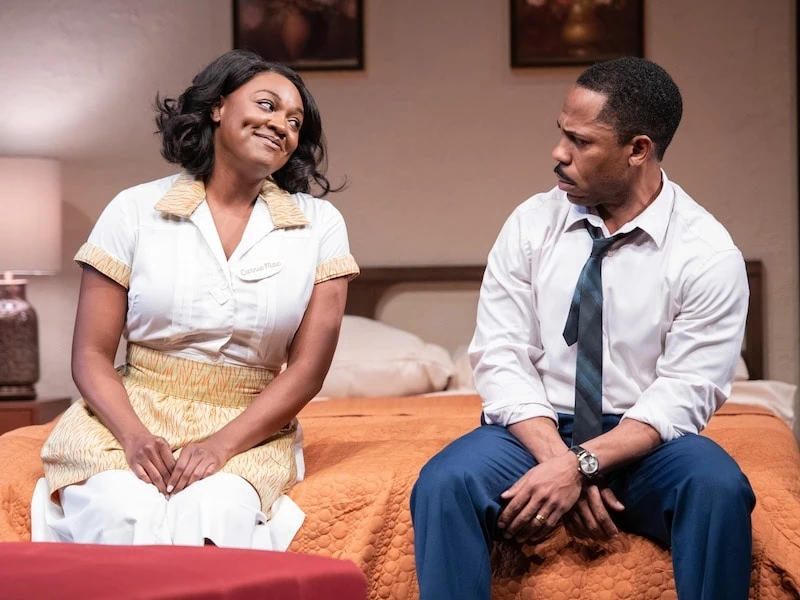By Whit Davis
This article was originally published in DC Theater Arts here.
I’ve always wanted to sit with Dr. Martin Luther King Jr. on the mountaintop to gaze at the stars, to drink the Milky Way, and to pray silently to our ancestors. The mystery of Martin Luther King Jr.’s inner world has always been of great interest to me. Dr. King was a thoughtful writer. As much skill as he had on stages, in pulpits, in front of cameras, and on streets, he could command a page. His work lives with me like a ghost, gently haunting me to read more and better and then drown in his poetics. So much of his legacy is co-opted, repackaged, and sold by big corporations. They rework his image until he is more cotton candy than fire blazed to sundown towns.
Katori Hall’s play The Mountaintop (now playing at Round House Theatre) is a reminder, a wake-up call to all who think they know or knew King. She asks us to think, look, and listen again. She spars with our imagination. Her words land like Ali vs. Foreman. We’ve got to go deeper; no, we must go higher!
In The Mountaintop, we find King, played by Ro Boddie, in his hotel room in Memphis at the Lorraine Motel the night before his assassination. He’s alone working on his speech, but only briefly before the arrival of a woman who, at first, seems to be merely a hotel staff member navigating her first day bringing King the coffee he requested from room service. An assumed brief encounter turns into a heartfelt, intimate conversation. Camae (Carrie Mae), as her character pronounces it, played by Renea S. Brown, is utterly hilarious. She’s quick-witted, outspoken, edgy, and lyrically weaves curse words together to tickle your insides. King’s character finds himself in awe of her beauty, her light, and the way she shows up authentically. He unsuspectingly lets his guard down, discards his God-like persona, and allows her to see him vulnerable.
Throughout the brilliantly woven dialogue, Hall suggestively allows us to feel the looming darkness as King keeps describing not feeling well. Camae is never alarmed by his remarks as they share cigarettes and secrets throughout the night. King is frightened of the loud thundering noise from the storm, and Camae is his unexpected comfort. At a critical moment, King’s paranoia raises its head, suspecting her of being a spook, resisting the calling to see her more deeply, more spiritually, out of fear, out of what he knows has been whispering his childhood name, Michael.
King and Camae both take command of the stage, supported by the set design of the hotel room, thanks to Paige Hathaway. The actors are both keenly aware of their mannerisms and the space they occupy. There’s something special about their performance. They share chemistry, trust each other, and know where the other ends and begins. Brown and Boddie are evenly matched in talent and build off each other with each line. The actors have great respect and seriousness for their roles. Boddie as King is powerful yet gentle. He makes King human. He brings him down to his details, to what makes a man, to the heart of what it means to be a person. Both actors are brilliant and deserve our witnessing, celebration, and acknowledgment for giving their all to this production.
TOP: Renea S. Brown (Camae) and Ro Boddie (Dr. Martin Luther King Jr.); ABOVE: Ro Boddie (Dr. Martin Luther King Jr.) and Renea S. Brown (Camae) in ‘The Mountaintop.’ Photos by Margot Schulman Photography.
After the climax, there is a sweet, honest moment between Camae and King, arguably where the play could have ended. Instead, Hall shifts us to a montage of Blackness, a dreamlike passing of the baton by King. This part of the production seems disjointed and whimsically too hopeful. What if Delicia Turner Sonnenberg’s directing deviated from Hall’s ending into something more cunning, daring, and shocking? I love celebrating our Blackness, but I’m interested in narratives that allow minds to travel to an abstract end. I wanted the audience to be responsible for reflecting and contending with going further into our inner world. Finding joy when the darkness King felt is still alive feels forced. I have to ask Hall, who did you write this ending for? America is still America. Yet, as I wrestle with Hall’s creative choices, which are inspiration from her mother, I cannot help but be thankful for her talent. She’s undeniably one of the best storytellers we have now. From the stage to television, she skillfully entertains and seduces our intellect.
The Mountaintop is mandatory viewing!





No Comments